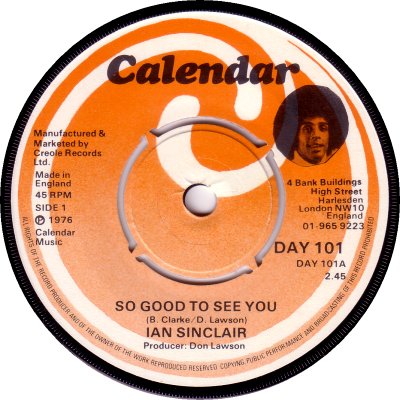
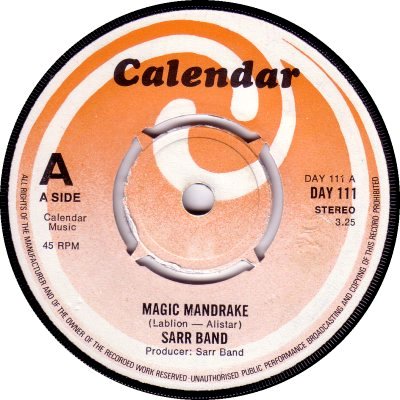
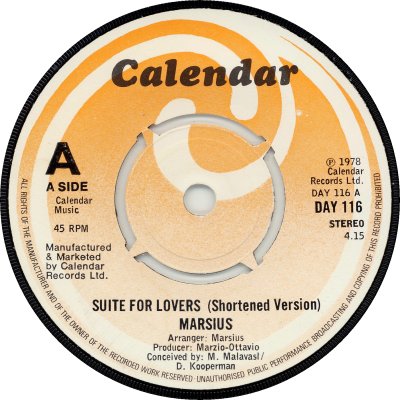
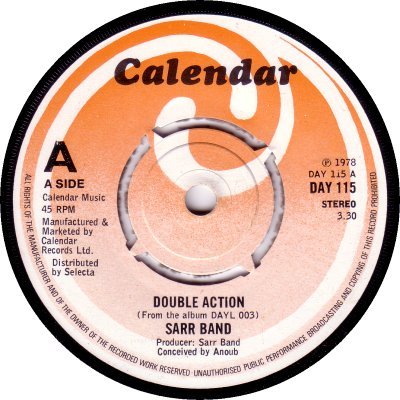
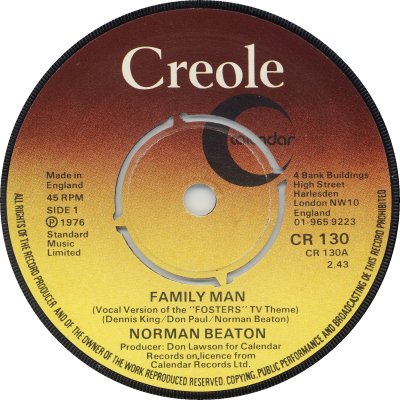
Owned by Don Lawson, and thus a successor to his 'Seven Sun' (q.v.) label. Calendar's first mention in 'Music Week' came in the issue of the 24th of April 1976, which reported that Lawson had formed the company with Fred Parsons (previously of B&C and Mooncrest); according to the article the pair hoped to conclude a distribution deal 'in the next few weeks'. A couple of Calendar productions were soon licensed to Creole Records (q.v.) and appeared on the Creole label, one with a Calendar logo added (5), one without: they were Ian Sinclair's 'I Can't Ask For Anything More Than You' b/w 'Hold It A Minute Suzie' (CR-131; 7/76) and 'Family Man' b/w 'The Skin' by Norman Beaton (CR-130; 5/76) - oddly enough, the Calendar logo never featured on any actual Calendar label. Then on the 17th of July 'MW' announced that Lawson had signed a three-year licensing deal with Creole. Records on the Calendar label duly began to appear, but it seems that the deal lasted for only six months or so, and it resulted in a mere four singles. 'MW' of the 26th of March 1977 revealed that Calendar had joined forces with Reg McLean's 'Circle International' company (q.v.); the article stated that Calendar had been formerly licensed to Creole but that since the link-up with Circle International it had been distributed by Decca. It gave the address of both of the companies as 89 Chiswick High Road, and said that the first products to come under the new deal were Marie Pierre's 'Super Boy' and Handbag's 'You're My Destiny'; singles by Norman Beaton and the Cool Notes were in the pipeline. The Marie Pierre record had already been in the shops for two months; it and the Cool Notes record were on Circle International, while the Norman Beaton - a reissue of 'Family Man' - came out on Calendar. The Handbag single appears to have been shelved; the track did however see the light of day as part of the 'Snatchin' By Handbag' LP on the Italian 'Punk Rock' label (MPK-17 001; 1978). There are a few unused numbers in the Calendar discography at around this point, so it may be that one of them was originally intended for 'You're My Destiny'. 'MW' of the 30th of July broke the news that a new two-year pressing and distribution deal had been signed with Decca; DAY-109 was to be the first single under the new arrangement. According to 'MW' of the 13th of August the company had plans to enter the 'cassingle' market; nothing seems to have come of them, however. The following year 'MW' of the 14th of January 1978 said that McLean had left to join Saga, and that Calendar was now run by Don Lawson and Curiah McDonald. A couple of months later 'MW' (4th March 1978) reported that Lawson was running the company; it quoted him as saying that Calendar had a claim to be Britain's only surviving black-owned nationally distributed label, and that an effort was being made to 'fight off' its 'ethnic image' by signing an agreement to license material from Italian disco specialists Saar. Sadly, Calendar doesn't seem to have survived long into 1980. The few of its products that I have heard suggest that it had a Soul / Disco slant.
The design of the Calendar label remained basically unchanged throughout its existence, though there were some minor adjustments. During the early, Creole, era the labels had 'Manufactured and Marketed By Creole Records Ltd.' at 10 o'clock; these singles were actually pressed and distributed by EMI, which handled Creole at the time. In addition DAY-101 had Creole's address on it and a picture of the artist (1). After the split with Creole, starting with DAY-107, the manufacturing and marketing credit was changed from Creole Records to Calendar Records; this started out at 10 o'clock, and then, with a few exceptions, moved down to 8 o'clock, but it remained on the left. The move to Decca / Selecta for manufacture and distribution soon saw the introduction of a black 'A' on the appropriate side: it started off at 2 o'clock, with DAY-111, but got smaller and moved to 10 o'clock from DAY-113 onwards (3). Some pressings of DAY-111 have neither the 'A' nor the manufacturing and marketing credit (2), and DAY-112 lacks the 'A'; both types of DAY-115 add a 'distributed by Selecta' to the usual information (4). The difference in the width of the dinking-cuts between the EMI and Decca pressings is noticeable, EMI's being narrower. For the final single, which was 12" only and had a different type of label entirely, Stage One took over distribution. Calendar's period of operation was from 1976-80; the discography below has several holes in it, but the missing numbers seem not to have been used. Several of the later singles were available in 12" form.
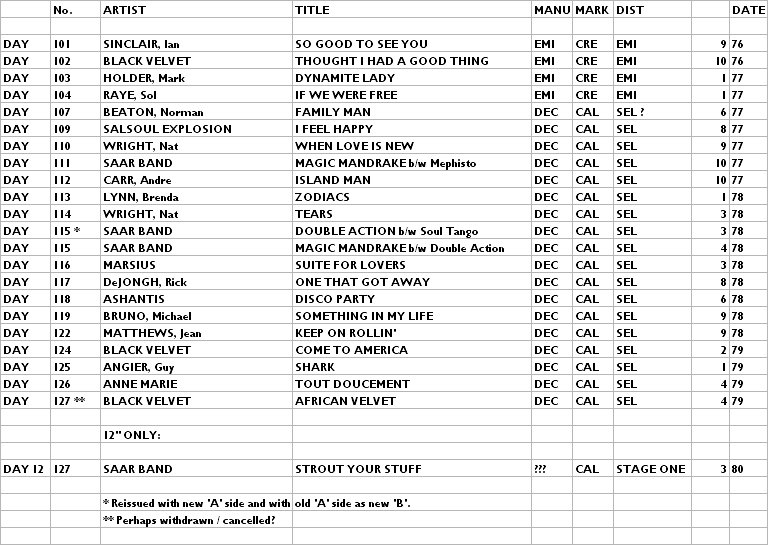


Copyright 2006 Robert Lyons.

